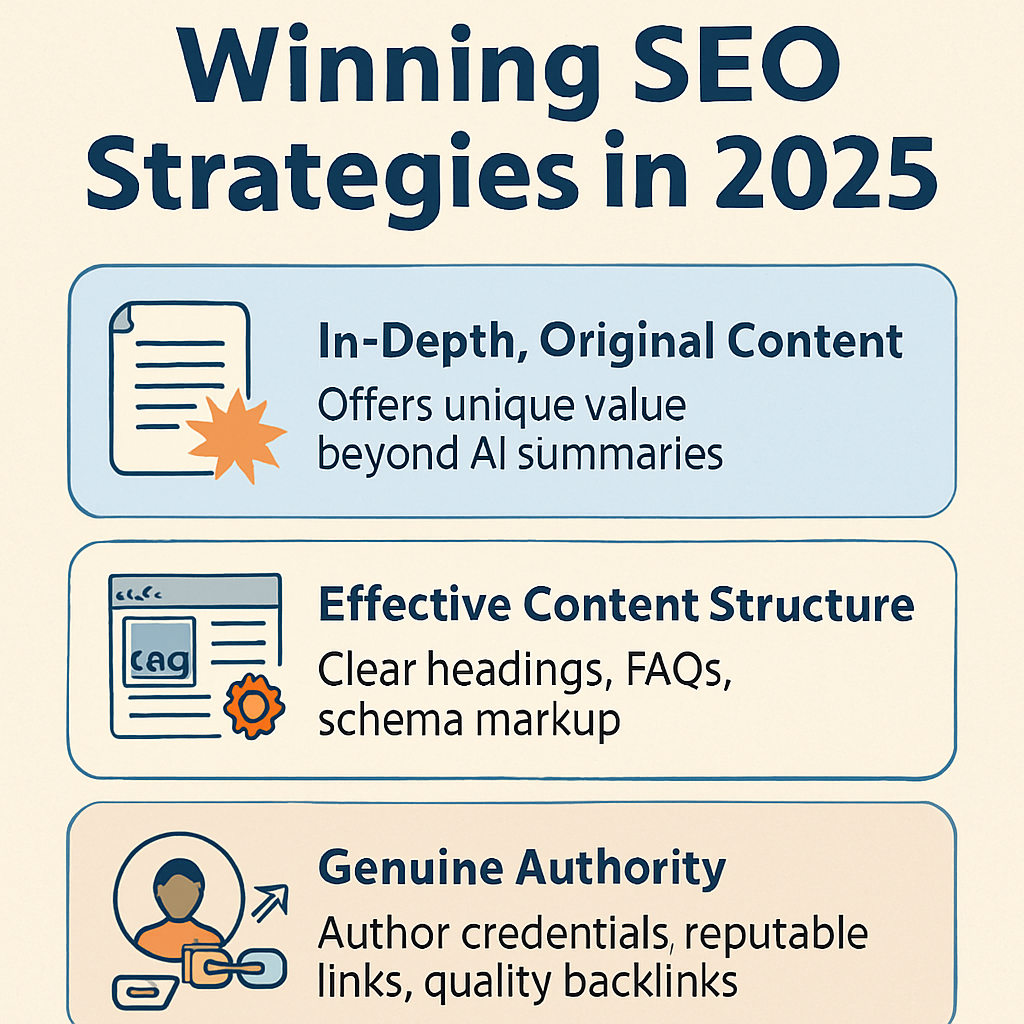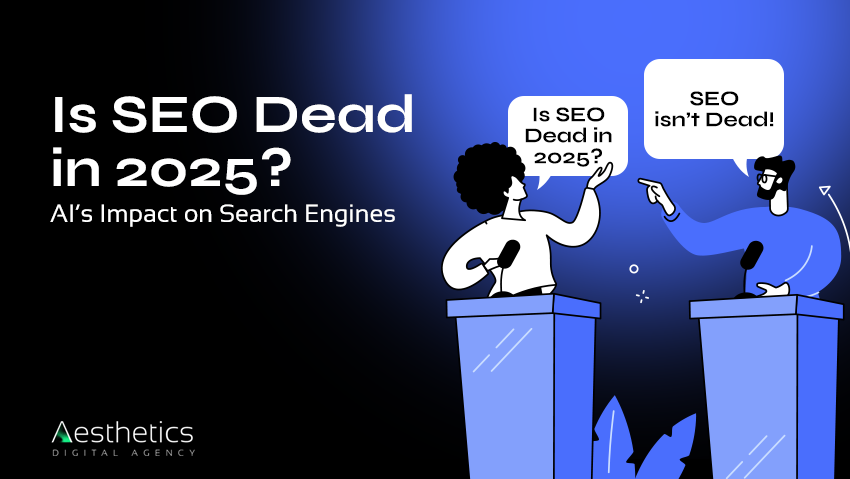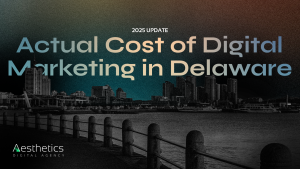Is SEO dead in 2025? I hear this question frequently from concerned business owners. With AI churning out instant answers and Google’s zero-click results stealing traffic, it’s easy to feel like the SEO game is over. Trust me, I’ve been in the trenches, and the landscape has shifted. But here’s the truth: SEO isn’t dead, it’s evolving.
The old-school keyword stuffing and link schemes? Those are toast. There are many strategies that once were but died long ago. However, the businesses that are truly succeeding today are those that’ve pivoted to what really matters: understanding user intent, creating genuinely valuable content, and maintaining visibility across multiple channels.
If you’re willing to adapt your strategy for this new era, SEO remains one of the most powerful growth engines for your digital presence.
What’s New in SEO?
The new SEO era of 2025 has introduced several groundbreaking developments that savvy marketers need to embrace. Zero-click searches have become increasingly prevalent, with AI Overviews from Meta appearing in nearly 13.14% of all search results by late 2024, and over a third of business and technology queries now feature these summaries.
While this presents challenges, Google has responded to content creators’ concerns by adding more citation links in its AI-generated answers, potentially creating visibility opportunities for smaller websites that previously couldn’t compete for top rankings.
Search diversification has emerged as another significant trend, with traditional Google dominance being challenged by alternative platforms. Users are increasingly turning to specialized forums, video platforms such as YouTube and TikTok, and AI-powered search engines for their information needs.
This shift demands a multi-platform approach to visibility, with content optimization extending beyond traditional search to include video SEO, conversational queries, and platform-specific strategies. Additionally, topics like sustainability and “Green SEO” are gaining traction as users increasingly factor environmental considerations into their search behaviors and brand preferences.
AI’s Impact on Search Engines
AI has fundamentally transformed the search ecosystem in 2025, creating both challenges and opportunities for SEO practitioners. Google’s Search Generative Experience (SGE) now delivers AI-generated summaries directly in search results, reducing the need for users to click through to websites. This shift toward “Generative Engine Optimization” has forced marketers to rethink their approach to visibility and traffic generation.
The integration of AI into search algorithms has dramatically improved their ability to understand context, user intent, and natural language nuances. Search engines now prioritize content that genuinely solves user problems rather than simply matching keywords, making traditional optimization techniques increasingly obsolete. As one expert notes, “Rankings favor pages that are crafted to genuinely aid users, almost in a conversational way.”
For content creators, AI serves as both a competitor and a tool. Nearly one-third of marketing professionals were already using generative AI for SEO tasks by 2024, with adoption rates climbing significantly in 2025. Smart marketers are leveraging AI to:
- Streamline competitor audits and keyword clustering
- Identify content gaps and research opportunities between niches and content
- Generate initial content drafts that can be enhanced with human expertise
The key differentiator in this AI-dominated realm is providing depth and originality that automated systems can’t replicate. Successful strategies focus on “in-depth coverage” that goes beyond the surface-level information AI can summarize. This means incorporating original research, personal anecdotes, expert interviews, and brand-specific insights that add genuine value beyond what AI can generate independently.
Thematic coherence and topical authority have gained importance as AI systems better understand relationships between content pieces. Building comprehensive topic clusters that demonstrate expertise across related subjects helps establish credibility with both users and algorithms in this new search paradigm.
While some fear AI will make traditional SEO obsolete, the reality is more complex. As Forbes notes, “From smarter algorithms to advanced tools and evolving search behaviors, AI is reshaping the way we approach optimization.” Those who adapt by combining AI tools with human creativity and expertise will continue to thrive in this evolving landscape.
E-E-A-T and User Experience
In 2025, Google has transformed how websites rank by prioritizing genuine human value through E-E-A-T (Experience, Expertise, Authoritativeness, and Trustworthiness). Just look at the Mayo Clinic, where real doctors create content that consistently outshines generic health blogs. This isn’t just algorithm-chasing; it’s about building trust with your audience through authentic expertise.
Beyond credentials, the user experience has become the make-or-break factor for modern SEO success. Google’s Core Web Vitals now influence over a third of ranking decisions, rewarding sites that feel good to use. Smart SEO pros are focusing on technical improvements like adaptive image loading while creating content that genuinely solves problems.
The results are compelling sites with intuitive navigation see conversion rates jump by 27%. Today’s winning strategy? Create content that feels like a helpful conversation with a knowledgeable friend.
Winning SEO Strategies You Must Know in 2025

The SEO landscape of 2025 is a far cry from the keyword-stuffing, link-building days of old. If you’re still relying on those outdated tactics, you’re not just falling behind – you’re practically invisible. The battlefield has shifted, and only the most agile, forward-thinking marketers will conquer. Forget what you thought you knew about SEO; here’s the brutally honest truth about what’s working right now and what you need to be doing to dominate the SERPs.
1. Content Authenticity: Your AI Antidote
Let’s face it: AI-generated content is everywhere. It’s cheap, it’s fast, and frankly, it’s often bland. Google knows this, and they’re not fooled. In 2025, search engines are ravenously rewarding original, experiential content that bleeds genuine expertise.
What does this mean for you? Stop churning out generic articles. Instead, become a content curator of real-world knowledge. This means:
- Partnering with Subject Matter Experts (SMEs): Don’t just interview them; get them to create content. Imagine a financial blog featuring articles written by a certified financial planner, or a health site with insights directly from a registered dietitian.
This isn’t just about quotes; it’s about their unique perspective and lived experience. Example: Instead of a generic “Top 10 Weight Loss Tips” article, collaborate with a nutritionist to publish “My 5-Day Meal Plan for Sustainable Energy: A Dietitian’s Perspective,” complete with personal anecdotes and specific food recommendations. - Showcasing First-Hand Experience: Did you personally test a product? Share the results, the good, the bad, and the ugly. Did your company implement a new strategy? Document the process and the outcomes. This builds credibility and directly satisfies Google’s enhanced E-E-A-T (Experience, Expertise, Authoritativeness, Trustworthiness) requirements.
2. Intent Optimization: Beyond the Keyword Graveyard
If you’re still obsessing over keyword density, you’re living in 2015. The data is screaming at us: only a meager 5.4% of Google’s AI Overviews contain exact query matches. This isn’t about matching words; it’s about understanding the why behind the search.
Your new mantra should be to address the granular questions users are asking. Think like a detective, not a robot.
- Focus on Problem-Solving: What pain points are your potential customers experiencing? What solutions are they seeking? As an example, instead of targeting “best running shoes,” think about the user who searches “how to prevent shin splints when running” or “running shoes for flat feet”. Your content should directly answer these specific needs, even if the exact keywords aren’t present.
- Leverage “People Also Ask” and Related Searches: These are goldmines for understanding user intent. Use them to craft comprehensive content that anticipates follow-up questions and provides complete answers.
3. Multi-Platform Visibility: Beyond the Google Bubble
Google isn’t the only game in town anymore. Users are diversifying their search habits, and you need to be where they are.
Where else do you need to be seen?
- TikTok: Don’t dismiss it as just a dance app. Short-form video is a powerful discovery engine, especially for product reviews, tutorials, and quick tips. Example: A beauty brand can create 60-second tutorials on TikTok showcasing specific makeup techniques, linking to their website for full product details.
- YouTube: The second-largest search engine, period. Long-form video content, educational series, and product demonstrations thrive here.
- Specialized Forums & Communities: Think Reddit, industry-specific forums, or even Facebook groups. These are highly engaged audiences actively seeking information and recommendations. Participate authentically, provide value, and subtly guide them back to your resources.
4. Topic Clusters & Thematic Coherence: Become the Authority
Gone are the days of isolated blog posts. In 2025, Google wants to see that you’re a true authority on a subject, not just a one-hit wonder. This is where topic clusters come into play.
How to implement this:
- Identify Core Topics: What are the broad themes central to your business or niche?
- Create Pillar Content: Develop one comprehensive, in-depth piece of content for each core topic. This could be a definitive guide, an ultimate resource, or an extensive tutorial. Example: For a digital marketing agency, a pillar page might be “The Ultimate Guide to SEO in 2025.”
- Develop Supporting Cluster Content: Create numerous shorter, more specific articles that link back to your pillar content and to each other. These articles delve into sub-topics and specific questions related to your pillar. For the SEO guide, supporting content could be “Understanding Google’s E-E-A-T,” “Mastering Local SEO for Small Businesses,” or “How to Optimize for AI Overviews.” This interlinking signals thematic coherence and deep expertise to search engines.
5. Zero-Click Optimization: Winning Before the Click
With featured snippets, knowledge panels, and AI Overviews dominating the SERP, users are often getting their answers without ever clicking on your website. This isn’t a threat; it’s an opportunity.
Your goal: Structure your content to appear in these prime positions.
- Implement Schema Markup: This structured data helps search engines understand your content better and display it prominently. Use schema for FAQs, how-to guides, recipes, product information, and more.
- Create Dedicated FAQ Sections: Directly answer common questions in a clear, concise Q&A format.
- Organize Information for Scannability: Use headings, subheadings, bullet points, and numbered lists. Think about how a search engine (and a busy human) would quickly extract key information. If you’re explaining a complex process, break it down into numbered steps.
6. Local SEO: The “Near Me” Revolution
Mobile and voice search are booming, making local SEO more critical than ever, especially for brick-and-mortar businesses.
Important SEO tactics for 2025:
- Optimize for “Near Me” Queries: Naturally incorporate local keywords and phrases into your content that are relevant to your location or city.
- Master Conversational Language: People are speaking to their devices naturally. Optimize for questions like “Where’s the best pizza near me?” or “What’s a good plumber in Melbourne?”
- Perfect Your Google Business Profile: This is your digital storefront. Ensure it’s 100% complete, accurate, and regularly updated with photos, business hours, services, and customer reviews. Encourage and respond to reviews – they are massive trust signals.
- Get yourself listed on reputed listing sites like GoodFirms and Clutch.
7. Technical Excellence
While content and authority are king, technical SEO is the foundation upon which everything else stands. Neglect it, and your entire strategy crumbles.
Non-negotiables for 2025:
- Page Speed: Users have zero patience for slow-loading websites. Aim for lightning-fast load times between 2.5- 3s
- Mobile Responsiveness: Your site must look and function perfectly on every device, from a massive desktop monitor to the smallest smartphone screen.
- Core Web Vitals: These Google metrics (LCP, FID, CLS) measure user experience. Optimize them relentlessly. This means ensuring your largest content paints quickly, your page is interactive fast, and layout shifts are minimal.
The Future of SEO is Now: Human + Technology
The bottom line for SEO success in 2025 is a powerful fusion: human expertise merged with AI technology. You need the human touch to create authentic, intent-driven content, and the technological prowess to ensure it’s technically flawless and visible across diverse platforms.
Those who master this delicate balance, who adapt rapidly to Google’s evolving algorithms and, more importantly, to the ever-changing needs of the user, will not just survive, they will thrive in the challenging yet rewarding SEO battlefield of today. Are you ready to lead the charge?







